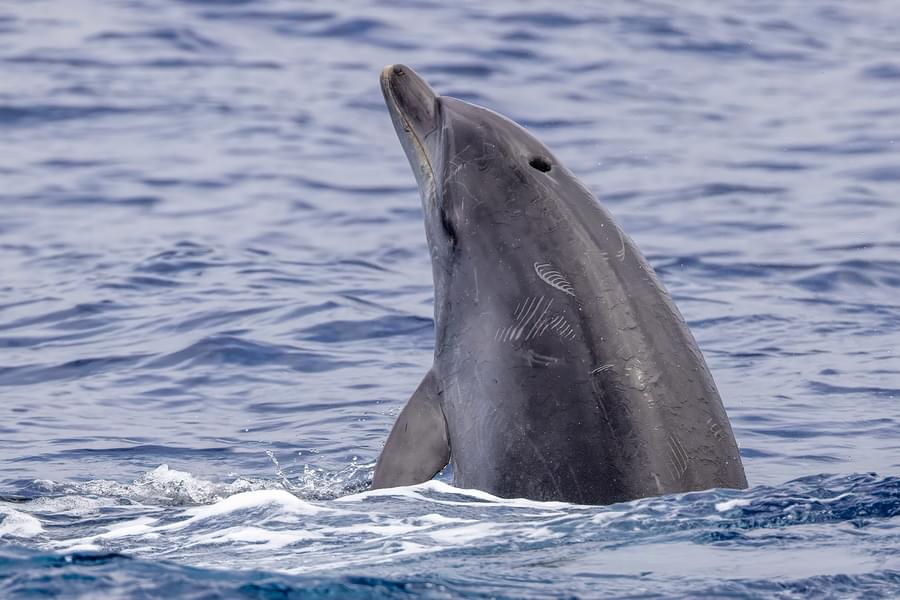A lone bottlenose dolphin in Lyme Bay, Dorset has been captivating visitors and locals - but behind the spectacle lies a growing worry for both the animal’s welfare and public safety.
The Marine Mammal Organisation (MMO) has voiced “increasing concern” after multiple potential marine wildlife disturbance offences were shared on social media. It urged: “Never swim with, touch, feed, or approach dolphins. If a dolphin approaches you, calmly leave the area. Human interaction can cause dolphins to lose their natural wariness, leading to injury or even death. Disturbed dolphins are also known to become aggressive toward people.”
The warning appears to follow a news story showing swimmers in close proximity to the dolphin under the rather cringeworthy headline: “A family were left stunned after a cheeky dolphin gatecrashed their morning swim, leaping about them and begging for tummy tickles.” The image showed three people surrounding the animal. While extraordinary for those involved, such coverage risks attracting more people hoping for the same “experience.”
Thea Taylor of the Sussex Dolphin Project said the dolphin’s actions may have been social in nature: “It may be that this curious dolphin was trying to mimic the people's upright position in the water. Playing and mimicking movement is one of the main ways dolphins secure bonds, so if it is solitary it may be trying to find connections. The behaviour does look like play, and the animal chose to stay with the family until it was ready to move away.”
However, she warned: “Encouraging interactions with people can be dangerous for the animal and people too. They are powerful animals and may not intentionally hurt people, but accidents can happen.” Observers also noted the dolphin performing “spy-hopping” - holding itself vertically and kicking with its tail to keep its head above water.
Jess Churchill-Bissett, Head of Marine Conservation (wildlife) at the MMO, said: “The arrival of a dolphin in a small coastal community can be a source of wonder and pride. But dolphins are vulnerable and unpredictable wild animals protected by law. We all have a responsibility to respect their space, keep a safe distance, and understand how our actions can unintentionally cause harm or even constitute a criminal offence.”
Concerns deepened after the dolphin was seen with an injury, likely from a boat propeller. The MMO will host an online community event on Thursday 14 August, 6–7pm, on safe behaviour around marine wildlife.
The risks come amid a sharp rise in recreational boating and paddle sports. Paddleboarding membership soared from 32,000 to 95,000 in just 18 months during the pandemic, and globally, electric boat numbers doubled between 2021 and 2023. While quieter and cleaner, electric boats’ near-silent approach poses new hazards for dolphins.
In Cornwall, Wildlife Trust staff recently filmed a pod off Mevagissey in which at least five dolphins had significant dorsal fin injuries, likely from high-speed watercraft or propellers. Veterinary Pathologist James Barnett said such damage was “most likely” from these impacts. Reports have also surfaced of boats driving directly through pods - an offence under the Wildlife and Countryside Act 1981.
The MMO and conservation groups are urging anyone heading out on the water to keep a safe distance and help ensure dolphins remain a living part of the UK’s coasts for generations to come.
Main photo: Bottlenose dolphin (credit Richard Lovelock)
.jpg?w=600&h=400&q=85&auto=format&fit=crop&dm=1683137512&s=b8de5152106350fb9c777ed95ab55f0b)
The only way we can protect whales and dolphins is by understanding their distribution, and so monitoring is vital for effective conservation. Donate today to help ORCA continue to identify and study important whale hotspots around the world by visiting www.orca.org.uk/donate

